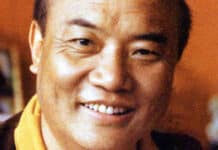By Carolyn Rose Gimian
Tomorrow is the Tibetan New Year. Tashi Deleg! It is also the day our family sets off on a trip to India and Nepal for three weeks. We have been telling people and each other that this is a form of pilgrimage for us. As I’m going over lists of gifts, medicines, and clothing, and writing requests for interviews with Buddhist teachers, it occurs to me to check the meaning of the word—pilgrim. An editor surrounded by reference books, of course, I look on the Internet, where the Free Merriam-Webster Dictionary tells me that a pilgrim is: one who journeys in foreign lands, or a wayfarer, or one who travels to a shrine or holy place as a devotee. The dictionary also reminds me that capitalized, a Pilgrim is one of the English colonists settling at Plymouth in 1620.
From this, I see that sometimes a pilgrim is one who is leaving home forever as in the case of the colonists in New England. This sets me to thinking about Chögyam Trungpa, Rinpoche, and all of the Tibetans who left their homes never to return. Here I am intimidated by going to India for three weeks my journey is inconsequential by this standard. (One never knows, of course, if we’ll be coming home, but we do have a return ticket.)
Then I remember that the Shambhala Archives contains small snapshots taken by Trungpa Rinpoche of holy places he visited in India in the early 60s. I remember seeing his photo of the Mahabodhi Temple in Bodhgaya and a photograph of him and the late Khamtrul Rinpoche standing next to a monument, which I suspect is one of the many pillars of Ashoka containing edicts of proper human conduct. I hope to see some of the same sites.
What do I mean when I refer to this trip as a pilgrimage? I think that’s my meditation for the journey. Fundamentally, it means that I aspire to have some kind of sacred outlook as I travel through India and Nepal. Let’s start with that! I expect that this seemingly simple aspiration will be challenged over and over again. I aspire to take my teacher’s journey as an example and an inspiration on this trip. Let’s see what happens as we get underway.
Comments
Pilgrimages can happen at any point in one’s life but it seem so meaningful for it to take place in the middle or later in life after having accumulated so much experience, practice and appreciation of the Three Jewels. How poignant to be able to physically and spiritually connect with so much that is intimately familiar. It reminds me of the first time seeing the sign for Tower Road in Halifax, another sort of Pilgrimage. I am so happy for Carolyn. -Marguerite Stanciu, Indianapolis

















